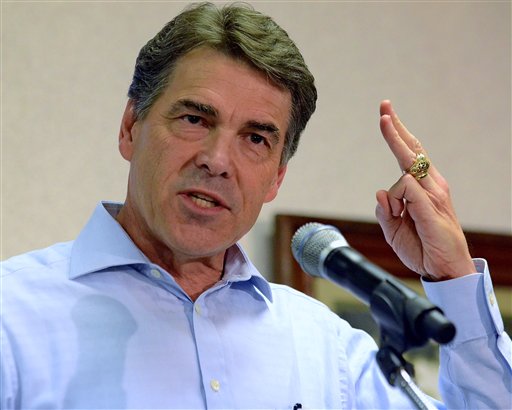(UPDATED)
Being the “dumb” candidate has actually been a pretty good formula for Republican presidential aspirants these past few decades.
Ronald Reagan was famously dismissed as “an amiable dunce” by Clark Clifford, a longtime player in Democratic politics, and the Carter White House was glad to draw him as an opponent in 1980 — until Reagan pulled away late in the campaign and racked up a 44-state landslide. And 20 years later, the “dumb” label was affixed to George W. Bush, who still managed to unite his party around him and end up in the White House.
That two of the three most recent Republican presidents were elected even after their intellectual credentials were ridiculed may be a source of comfort to Rick Perry right now, as the doubts about his intellect that have flourished in Texas for years follow him onto the national stage. Perry’s old college transcript, heavy with C’s and D’s, made its way into the press a few weeks ago, he seemed unable to answer a simple question about China last week, and now Politico has come right and asked the question: “Is Rick Perry dumb?” (Their conclusion: It’s complicated!)
It’s certainly possible that this kind of chatter won’t hurt Perry. If he can convince Republican activists and primary voters that it’s mainly the product of his enemies in the liberal media and the Democratic Party, then it could make him more attractive to them. Jonathan Chait has written about the role that conservative identity politics, “which is devoted to exploring and nurturing the cultural grievances endured by white people in the ‘Heartland’ at the hands of cultural elites,” plays in today’s GOP. Perry’s entire campaign seems to be rooted in forging an emotional connection with these voters, and so far it’s working quite well. They may come to regard attacks on Perry’s intellect as de facto attacks on their own brain power. This is how Bush forged and nurtured his connection with them.
And if the “dumb” issue doesn’t keep Perry from winning the GOP nomination, it also may not be an obstacle in November — provided economic anxiety is as high (or higher) than it is now and voters are eager to toss out Barack Obama. It was Reagan’s victory in 1980 that demonstrated just how much swing voters are willing to overlook when they’re in a firing mood. Democrats spent the campaign attacking Reagan as naive and extreme, and voters seemed to have real concerns about whether he was temperamentally suited for the presidency. But in the face of double-digit unemployment, inflation and interest rates, those concerns melted away.
That said, Perry may be vulnerable to the “dumb” card in ways that Reagan and Bush weren’t.
For one thing, both of them came to the race with a much firmer grip on the party. Reagan entered the 1980 campaign as the undisputed leader of the conservative wing of the national GOP, a role he’d cemented with his near-miss challenge to Gerald Ford in the 1976 primaries. Because the Republican Party was more diverse back then (with actual moderates and liberals), Reagan still had to endure a taxing primary season, but his triumph was almost inevitable: As long as the conservative wing was with him, he couldn’t lose. Similarly, Bush came to the 2000 race as the overwhelming GOP favorite, the clear (and lavishly funded) choice of his party’s most influential elected officials, money-men and -women, activists, interest group leaders, and media commentators. Their supporters knew all about Reagan’s and Bush’s intellectual reputations, they weren’t going to waver, and they had the numbers to guarantee victory.
Perry is not in the same situation. Sure, he’s gotten some encouraging early polling news, but he’s a late-starting candidate who doesn’t enjoy anywhere near the built-in support that Reagan and Bush brought to their campaigns. This means that most of the party’s influential forces — fundraisers, activists, commentators and so on — are still making up their minds about him. They aren’t yet invested in Perry the way they were with Reagan and Bush, which means they aren’t yet willing to automatically write off concerns that he’s “dumb.” Instead, they are likely to apply a much more practical test: If they think the issue will end up hurting Perry in the general election and costing their party a winnable presidential race, they won’t come on board.
This leads to the second problem Perry faces. When Bush was fighting off the “dumb” charges in 2000, he and his supporters could lean on a perfect talking point: the example of Reagan. See, they could say, it all worked out fine. But while Perry can play the Reagan card too, he’s also burdened with the example of Bush, whose presidency most Americans still desperately want to forget. To influential on-the-fence Republicans, Perry’s striking similarities to Bush are already cause for hesitation: Is he too similar for swing voters to handle?
That may be the real threat of the “dumb” issue to Perry. It makes him look that much more like a clone of a man Republicans absolutely don’t want to be talking about in 2012.
Update: As several emailers have pointed out, unemployment during the Carter years never reached double-digits — not even close. It peaked at 7.8 percent in July 1980. (Inflation and the the prime interest rate were both well over ten percent, though.) The text has been corrected.


